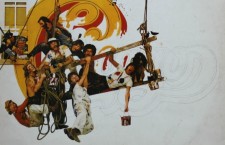I’ve been a fan of Peter Cetera’s voice most of my life, so what I’m about to say is as surprising to me as it is to anyone familiar with my affinity for Cetera’s vocals: Chicago’s “Aloha Mama” is a fantastic song – until Peter starts singing.
With a horn chart that sounds like it was pulled out of a speakeasy at the height of prohibition, “Aloha Mama” is perhaps musically the strongest song on 1979’s Chicago 13. And had this track been recorded as an instrumental, it might have even been considered a diamond in a very, very deep rough. One might even argue that this was one of the best horn charts of the post-Terry Kath era, and perhaps even better than some of the weaker efforts from James William Guercio’s tenure as original producer.
Instead, “Aloha Mama” features dreadful lyrics that were sung so horribly by Peter Cetera that even he tried to distance himself from the song by crediting the vocals to “PC Moblee.” (Hollywood directors used to similarly replace their names with “Allen Smithee” on movies they knew were bad, but had to direct anyway.) In the end, this song couldn’t save itself, even with a killer horn chart.
Here’s a theory about how Chicago got to this moment: In the original theatrical release of Ridley Scott’s Blade Runner, Harrison Ford added voice-over that was meant to give the movie more of a ’40s noir vibe to the film. Ford didn’t think it was necessary and wanted the producers to change their minds about it. So, he reportedly gave his absolute most bored and dismissive reading, in the hopes the narration would be scrapped.
By that same rationale, perhaps Cetera knew Chicago 13 was terrible, even as it was being recorded, and PC Moblee was merely his attempt to force the executives at Columbia to shelve the album in order to prevent it from profaning our ears. Either way, PC Moblee thankfully only made two appearances – and they’re both on Chicago 13. (The other is “Window Dreamin’.”)
“Aloha Mama” would have been a really solid instrumental had producer Phil Ramone or the band “accidentally on purpose” forgotten to insert Peter Cetera’s vocals. But, as is the case with most of 13, nobody was able to save Chicago from themselves.
- The Most Surprising Moment on Alan Parsons Project’s ‘Eve’ - August 27, 2024
- Why the Audiobook Versions of Jimmy Barnes’ Autobiographies Are Definitive - June 24, 2024
- Kahvas Jute – ‘Wide Open’ (1970): Antipodean April - April 28, 2024



